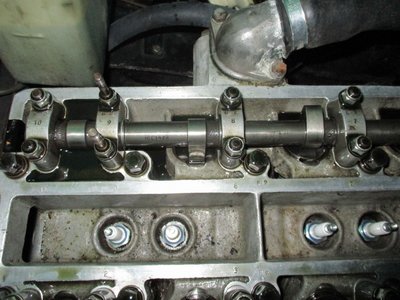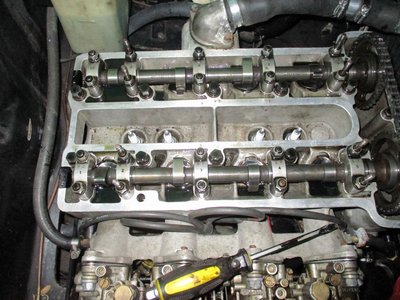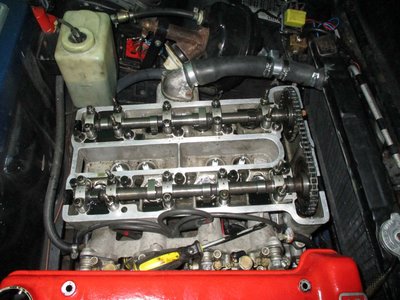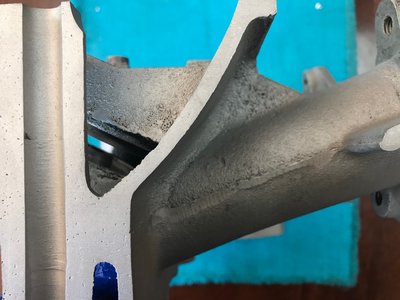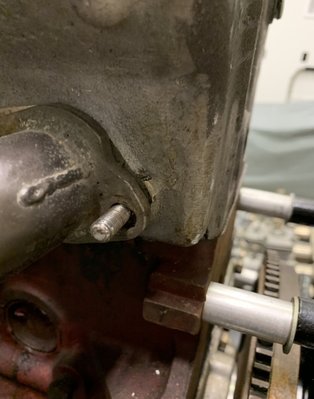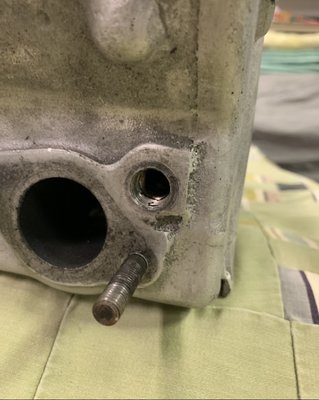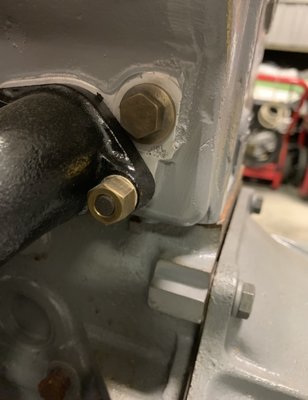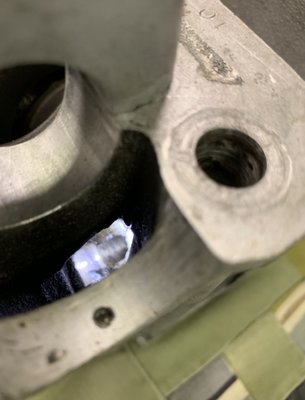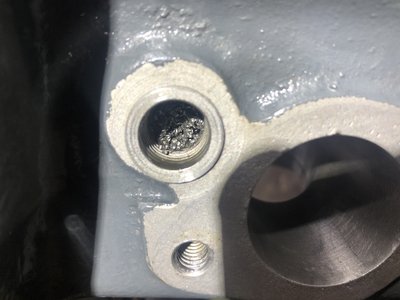Too much oil in head?
22 posts
• Page 1 of 2 • 1, 2
My Twink has always smoked on startup, then it clears and seems OK. I've just pulled the cam cover to check the timing chain and found this:
This is after I've started her up and run her for a few minutes. Theres lot of oil around the rear valves, is this normal - I'd assume it should drain down into the block, if so where are the drain holes?
Couple more snaps:
My question is - is this normal or do I have a drain problem?
Any assistance greatly received!
Matt
This is after I've started her up and run her for a few minutes. Theres lot of oil around the rear valves, is this normal - I'd assume it should drain down into the block, if so where are the drain holes?
Couple more snaps:
My question is - is this normal or do I have a drain problem?
Any assistance greatly received!
Matt
Matthew Vale - Classic Motoring Author
1968 Plus 2 - Somewhat cosmetically and mechanically modified
1969 Plus 2S - Currently undergoing nut and bolt restoration
Visit me on matthewvale.com
1968 Plus 2 - Somewhat cosmetically and mechanically modified
1969 Plus 2S - Currently undergoing nut and bolt restoration
Visit me on matthewvale.com
-

Matt Elan - Fourth Gear

- Posts: 604
- Joined: 27 Oct 2011
It is normal to have oil remaining in some head pockets (not having oil should be a cause of concern, as a symptom of lack of camshaft lubrication).
As for the initial smoke, are your valve guides old or still to specs? some oil can seep down the valve stem and burn upon startup - also some oily fumes may be swallowed by the crank breathing tube into the carbs for cyl #4, depending on the vacuum pulled. The chamber normally communicates back to the sump via the rubber hose (oil can also return to the sump via the front of the engine,
On the second photo you can see one hole that communicates with the venting chamber integrated in the head (between valve #3 and valve #4). Just blocking that hole would cause heavy oil deposit in the air box (from blow back, esp. if rings are sealing less than optimally or if a gasket leak in developping), which in turn would be burnt at startup.
So initial oil smoke may come form various causes, depending on wear location : if the amount of smoke is limited that should not be a major concern.
As for the initial smoke, are your valve guides old or still to specs? some oil can seep down the valve stem and burn upon startup - also some oily fumes may be swallowed by the crank breathing tube into the carbs for cyl #4, depending on the vacuum pulled. The chamber normally communicates back to the sump via the rubber hose (oil can also return to the sump via the front of the engine,
On the second photo you can see one hole that communicates with the venting chamber integrated in the head (between valve #3 and valve #4). Just blocking that hole would cause heavy oil deposit in the air box (from blow back, esp. if rings are sealing less than optimally or if a gasket leak in developping), which in turn would be burnt at startup.
So initial oil smoke may come form various causes, depending on wear location : if the amount of smoke is limited that should not be a major concern.
S4SE 36/8198
-

nmauduit - Coveted Fifth Gear

- Posts: 2000
- Joined: 02 Sep 2013
Mine was the same too, as above it seems to be the norm and the original cast iron guides are sketchy at best.
With my car i did everything i could to prevent changing the guides (heard stories of them becoming loose after they had been changed) so i had a set of valves made with oversize stems and had them ream out slightly bigger keeping the original guides but even with the guides well in spec and round i still got puffs of blue smoke one start up if it had been stood for a week or so. So skipping on i was convinced one of the guides was cracked (which turned out to not be the case) so i bit the bullet and had a set of bronze guides fitted which stopped the puffs of blue smoke but also strangely helped with the inlet vacuum balance which was always a bit bouncy on the iron guides.
My problem currently is the head to block tube seems to protrude into the head too much so i get a pool of oil that finds it's way out of the breather tube on hard right handers, i tried cutting the pipe down a bit but then it becomes hard to seal, either way i get a bit of an oily mess. Joys of Lotus ownership........
With my car i did everything i could to prevent changing the guides (heard stories of them becoming loose after they had been changed) so i had a set of valves made with oversize stems and had them ream out slightly bigger keeping the original guides but even with the guides well in spec and round i still got puffs of blue smoke one start up if it had been stood for a week or so. So skipping on i was convinced one of the guides was cracked (which turned out to not be the case) so i bit the bullet and had a set of bronze guides fitted which stopped the puffs of blue smoke but also strangely helped with the inlet vacuum balance which was always a bit bouncy on the iron guides.
My problem currently is the head to block tube seems to protrude into the head too much so i get a pool of oil that finds it's way out of the breather tube on hard right handers, i tried cutting the pipe down a bit but then it becomes hard to seal, either way i get a bit of an oily mess. Joys of Lotus ownership........
Chris
-

Grizzly - Coveted Fifth Gear

- Posts: 1862
- Joined: 13 Jun 2010
The oil in the cam follower pockets is normal. The oil from the head drains by flowing via passages in the casting around the ports and valves and followers to the front of the head. You can see the passage on the inlet side in the attached photo of the sectioned head I have. The inlet side also has drain holes in the head that line up with the blocks original push rod holes that assist with keeping the oil low on the inlet side which is critical to stop it being sucked down the guides. No 3 and 4 exhaust side valve area is prevented from draining easily to the front of the head by the water passages to the thermostat housing and there is a smaller and more convoluted drain passage that gets through to No 2 exhaust valve. This caused smoking problems on car in the first few years especially if the car was parked on a hill nose up and Lotus added a cross drilling from the rear exhaust side to the inlet side to improve drainage. That drilling if present on your head is just above and behind the No 4 exhaust port where you will see a plug if its present.
cheers
Rohan
cheers
Rohan
-

rgh0 - Coveted Fifth Gear

- Posts: 8416
- Joined: 22 Sep 2003
Thanks all - thats put my mind at rest and I'll check if the drilling is present when it stops raining here!
Matthew Vale - Classic Motoring Author
1968 Plus 2 - Somewhat cosmetically and mechanically modified
1969 Plus 2S - Currently undergoing nut and bolt restoration
Visit me on matthewvale.com
1968 Plus 2 - Somewhat cosmetically and mechanically modified
1969 Plus 2S - Currently undergoing nut and bolt restoration
Visit me on matthewvale.com
-

Matt Elan - Fourth Gear

- Posts: 604
- Joined: 27 Oct 2011
Back in the mid 60s, a bunch of us Southern Californian Elan owners (Lotus/West car club) discovered the oil drain problem which Rohan described. Several of us drilled and tapped a 1/2" hole in the head into the pocket behind exhaust 4 valve and ran an external line back to the sump. Problem solved.
Herb
26/4618
26/4618
-

lotusS2guy - Second Gear

- Posts: 99
- Joined: 05 Oct 2010
Herb, I've done exactly the same modification to an S1 and S2 both of which had early head without the cross drilling Rohan described.
It solves the issue straight away, it was spotted by a few Lotus owners in Australia who told me I had an early TC development head.... I simply smiled!
Vaughan
It solves the issue straight away, it was spotted by a few Lotus owners in Australia who told me I had an early TC development head.... I simply smiled!
Vaughan
Last edited by Vaughan on Thu Oct 31, 2019 9:08 am, edited 1 time in total.
- Vaughan
- First Gear

- Posts: 49
- Joined: 11 Apr 2009
If I'm correct the oil in a TC head drains back to the oil pan via the timing chain housing and the 8 pushrod on the right side of the cylinder block. Early heads had no oil flow from the exhaust to the intake side. Consequently the oil that pools under the exhaust cam must travel all the way forward to the timing chain housing where it can drain back to the oil pan.
Sometime in TC head manufacturing a cross drilling was added so oil can flow from the exhaust side rear to the intake side and drain to the oil pan via the pushrod holes.
Without the cross drilling above and with cross
drilling below.
Cross drilling seen under and behind the rear most exhaust cam bearing....
Sometime in TC head manufacturing a cross drilling was added so oil can flow from the exhaust side rear to the intake side and drain to the oil pan via the pushrod holes.
Without the cross drilling above and with cross
drilling below.
Cross drilling seen under and behind the rear most exhaust cam bearing....
- lance54
- Second Gear

- Posts: 131
- Joined: 09 Apr 2008
So the oil gallery cross passages terminate at the brass plugs located above both the number 1 and number 4 exhaust port openings. Is that correct? - or is it just the one above number 4? I want to just undo the plugs I need to and don't want to touch any water passage plugs if I don't have to because typically they can be frozen in place and not necessary to remove.
1970 Ford Escort Twin Cam
1972 Ford Escort GT1600 Twin Cam
1980 Ford Escort 2.0 Ghia
Peugeot 505 GTI Wagons (5spdx1) (Autox1)
2022 Ford Fiesta ST.
1972 Ford Escort GT1600 Twin Cam
1980 Ford Escort 2.0 Ghia
Peugeot 505 GTI Wagons (5spdx1) (Autox1)
2022 Ford Fiesta ST.
- 2cams70
- Coveted Fifth Gear

- Posts: 2166
- Joined: 10 Jun 2015
Yes, the plug adjacent to the no 1 exhaust is the cross drilling for the exhaust camshaft bearings oil supply. I found a similar, if smaller, collection of debris and swarf behind this plug after machine shop visit....
Edited to add: Can the exhaust side oil drain cross drilling at the rear be added to an early type cylinder head (in my case an early sandcast rather than a die cast head)?
Malcolm
Edited to add: Can the exhaust side oil drain cross drilling at the rear be added to an early type cylinder head (in my case an early sandcast rather than a die cast head)?
Malcolm
1966 Elan S3 Coupe
1994 Caterham 7
1994 Caterham 7
- englishmaninwales
- Fourth Gear

- Posts: 710
- Joined: 26 Jul 2013
22 posts
• Page 1 of 2 • 1, 2
Total Online:
Users browsing this forum: No registered users and 42 guests

